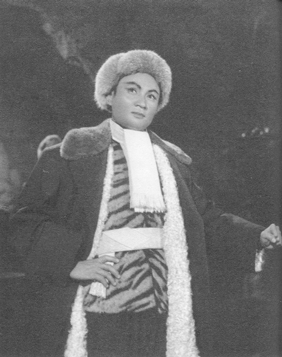Political opera that is nostalgic in China is kitsch to Western eyes
During China’s Cultural Revolution, which lasted from 1967 until 1976, all art was intended as propaganda. More than 13 Maoist operas were written, but the eight most popular become known as the “yang ban xi,” or “eight model works.” Madame Mao, a frustrated actress, was responsible for banning traditional opera and placing the yang ban xi in its place. Once they were filmed, their actors became celebrities. Then Mao died, and his widow was indicted and blamed for all the ills of the Cultural Revolution. The yang ban xi were banned.
For most of its first half hour, “Yang Ban Xi: The Eight Model Works” is a fairly staid documentary, despite the device of having Madame Mao, voiced by an uncredited actor, as its narrator. Then the director, Yan Ting Yuen, goes for a cab ride. Her driver starts singing from one of the yang ban xi, “The Red Women’s Detachment.” His two young passengers join in.
The scene is obviously staged, a bit clumsily. They leave the car but continue singing. The street turns into an open-air dance studio, as they’re joined by a large group of performers. The song turns into a Chinese opera remix, combining traditional instrumentation with hip hop and techno-influenced beats. The sequence owes more to music videos than the yang ban xi clips Yuen shows, but it shows a bridge being constructed between the past and present.
Much Communist propaganda now looks like kitsch to Western eyes. The yang ban xi seem particularly dated. Politics is only part of it—the clips included in Yan’s film are bluntly theatrical, full of obviously painted backdrops and blaring Technicolor. They’re as stylized as the ‘50s Hollywood melodramas that often draw laughter from young audiences today. Yet they were inescapable during the Cultural Revolution and have become an essential part of Chinese history.
Artists and musicians interviewed by Yuen view the operas with an affection that’s tinged with irony but not entirely subsumed by it. “Yang Ban Xi: The Eight Model Works” has been criticized for glossing over the Cultural Revolution’s tragedies, but it conveys a sense of the sheer arbitrariness of the period’s politics.
Actor Tong Xiang Ling became a star in the play “Taking Tiger Mountain By Strategy,” but he and his entire family were accused of feudalism and his career was halted dead in his tracks. He was forced to perform menial tasks in the theater for two years. His wife Zhang Nanyum was denounced by Madame Mao for being too beautiful. On the other hand, dancer Xue Qing Hua was associated too closely with the yang ban xi and her career died when they fell out of favor. Forbidden to dance onstage, she became a seamstress.
Yuen mixes interviews with clips of yang ban xi films and present-day performances. She introduces each subject against a painted backdrop, giving their profession and age. However, “Yang Ban Xi: The Eight Model Works” is most interesting when it abandons these well-worn documentary conventions and tries to speak about music from the inside. Tellingly, the yang ban xi sound much better when their lyrics aren’t subtitled. At least as translated into English here, they’re awkwardly phrased, while the music retains a certain power on its own. Yuen captures its appeal extremely well, especially in a scene where teenagers ice skate as a yang ban xi score plays.
Certainly, “Yang Ban Xi: The Eight Model Works” isn’t a thorough history of the Cultural Revolution or even of the plays themselves. The device of having Madame Mao as the narrator doesn’t work too well—she’s an incredibly grating presence, and her influence warrants a documentary all her own. The film’s heart lies elsewhere. It seeks to examine how art takes on a life of its own in its spectators’ minds.
An unsympathetic observer could say that the Chinese artists and musicians who look on the yang ban xi with affection are suffering from cultural Stockholm syndrome. As propaganda, they now look rather childish and simplistic, but despite all the changes China has undergone in the past 30 years, their celebration of idealism still means something to their admirers.
gaycitynews.com



































